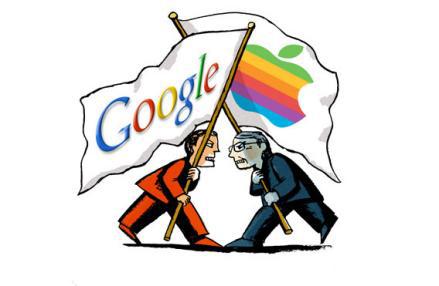Reminder: Matt Yglesias and Farhad Manjoo are wargaming a fanciful, definitely-not-actually-true version of what might happen if Google and Apple went to war. You can see how the battle began here.
As of Oct. 12, 2013, Google has:
Cash on hand: $54 billion
Employees: 45,000
Territory controlled: Office buildings, server farms, the political sympathies of the Republican Party in the United States, and the governments of India, Mexico, South Africa, and all of South America.
When Larry Page learns about Apple’s acquisition of Duck Duck Go, a strange quiver grips his torso, something like the sensation of being tickled. Once, years ago, he’d felt something similar while watching a clip of America’s Funniest Home Videos on YouTube. Sergey had identified the sensation as “experiencing humor,” but Page didn’t have time for Sergey’s nonsense, and instead he instructed his scientists to buy YouTube and get to the bottom of its strange power.
“Duck Duck Go?!” he asks his fellow execs. “That’s their plan?” Sure, the little search engine got some good post-PRISM press, but everyone in the search industry knows that it’s heavily dependent on partnerships with Yahoo, Bing, and other Web behemoths for its results. Duck Duck Go is barely even a real search engine. And it’s easily swatted away: Page directs his search team to present an ultimatum to every site on the Web. They’ve got 48 hours to permanently bar Duck Duck Go from indexing their pages—or face Google’s wrath. For most sites, being banned from Google is tantamount to being banned from the Web. Billions of pages instantly alter their Robots.txt files to shun Duck Duck Go. Apple’s search engine is DOA.
“More like Duck Duck Go away, am I right?” smirks Sergey, but Page is in no mood. Killing Apple’s search engine has given him a bolder idea: Folks around the world may like Apple, but they need Google. For most of what Google does—search, mapping, image detection, machine translation, video hosting, speech recognition, cloud-based email and calendars—Apple’s offerings are either laughably inferior or nonexistent, and it would take more than just a few quick acquisitions to match Google’s prowess. Meanwhile Google can match Apple pretty well—sure, its phones and tablets aren’t as pretty, but they work, don’t they?
So, if this really is war, why not force the world to choose? They can have Apple’s pretty baubles. Or they can have Google’s power. But not both. The message flows out to anyone who enjoys a cut of Google’s gravy train, which is pretty much everyone. (In 2012, clicks from Google generated $94 billion in economic activity in the United States alone.) The world’s retailers and cell carriers are forced to submit—if they keep pushing Apple’s products, they’ll face a drastic reduction in leads generated through Google. Apple notices an immediate drop in sales. The press, too, is kept in line. When the New York Times’ editorial board aligns with Apple, Google disappears the site. The Wall Street Journal is kinder—and sees a surge in traffic.
Page’s lawyers and D.C. lobbyists go crazy about that one. Members of Congress are threatening hearings, the Justice Department is promising charges, the president has called in a huff. Page doesn’t take the call. He doesn’t look worried—and, in fact, the next day the Republican Party suddenly announces that it’s aligning with Google, and the Democrats appear agreeable as well. The U.S. House and legislatures in 30 states begin work on laws that would force Apple to reinstate Google’s search engine in iOS. A similar bill is taken up in the European Parliament. Meanwhile, lawmakers in India, Mexico, South Africa, and pretty much all of South America—countries where Apple products are confined to a rarefied elite, while Google is enjoyed by the masses—follow suit in aligning with Google. The search company’s lobbyists are stunned. “How’d you do that?” Google’s D.C. chief asks Page. “Oh, it was nothing,” he says. “I just explained that they’ll need us in 2014. And I reminded them that we read all their email.”
